October 25, 2022
Kaitlin Emmons and Margarita Kalinina-Pohl
The US-Black Sea Nonproliferation Professionals Exchange is a platform for advancing intergenerational and multidisciplinary dialogue on critical international security and weapons of mass destruction (WMD) nonproliferation priorities. The exchange group is made up of nuclear and regional security experts from the Black Sea region representing government, civil society, research institutions, and academia. Current participants hail from Bulgaria, Georgia, Moldova, Romania, Turkey, and Ukraine, and several are former CNS visiting fellows.
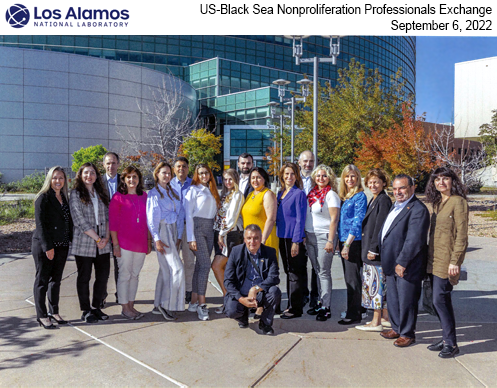
Participants at the Los Alamos National Laboratory
The US-Black Sea Nonproliferation Professionals Exchange held its inaugural session in Vienna from April 26-29, 2022. Goals for the initiative developed during that session included enhancing regional expertise through country visits, creating a cross-discipline network within the region, serving as a hub for related in-depth expertise, empowering younger generations (by engaging, promoting, and supporting), and fostering engagement with government, academia, industry, civil society, and scientific communities.
To continue strengthening the US-Black Sea Nonproliferation Professionals Exchange and to keep the momentum after the inaugural session, CNS organized a US Module that included tours of US National Laboratories and a program in Washington, DC from September 4-15, 2022. The US Module provided a channel to allow deeper coordination and support between nonproliferation professionals (scholars, researchers, diplomats, and practitioners) in the international WMD community.
Twenty participants of the US-Black Sea Nonproliferation Professionals Exchange traveled to the US for this module and 75% of those in attendance were women. The program for this module included briefings by national laboratories on their international cooperation work with a focus on the Black Sea region, a discussion with a prominent scientist, panel discussions with experts from US government bureaus and think tanks, and interactive presentations by Washington DC-based CNS experts.
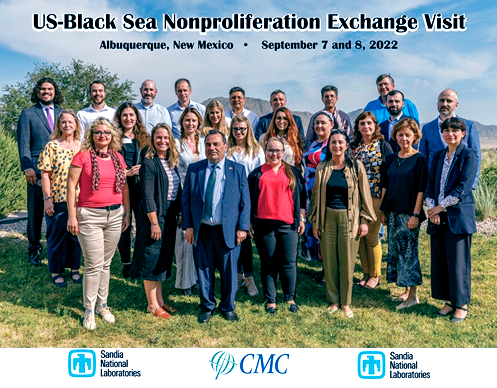
Participants at the Sandia National Laboratory
Tours of National Laboratories
The first part of the US module took place September 4-10, 2022 with visits to Los Alamos National Laboratory (LANL) in Los Alamos and Sandia National Laboratory (SNL) in Albuquerque, NM. Participants attended several meetings where labs staff, scientists, and experts provided briefings on scientific diplomacy and cooperation, regional security, technological innovation, best practices, and how to advance shared goals between the national laboratories and those of the US-Black Sea Nonproliferation Professionals Exchange initiative. Sandia’s visit was hosted by MIIS alumna Sara Beth Marchert, Senior Member of the Technical Staff.
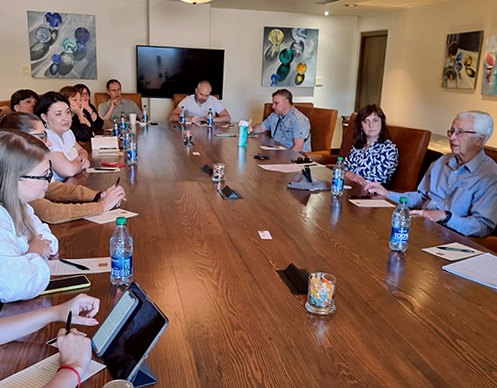
Conversation with Dr. Sig Hecker
One of the highlights of the “labs week” was a meeting with Dr. Siegfried (Sig) Hecker. Dr. Hecker, former LANL director and world renowned nuclear expert, was recently appointed as a distinguished professor of practice at CNS. Dr. Hecker based his discussion with the group on his interview with the Bulletin of Atomic Scientists titled, “Siegfried Hecker: Putin has destroyed the world nuclear order. How should the democracies respond?” and then took questions from the group which focused on threats to Ukrainian nuclear facilities during Russia’s invasion. Dr. Hecker also praised an interview by one of the participants and the former CNS visiting fellow Valeriia Hesse with the Bulletin of Atomic Scientists where she expertly assessed the possible impact of a military attack on the Zaporizhzhia nuclear power plant.
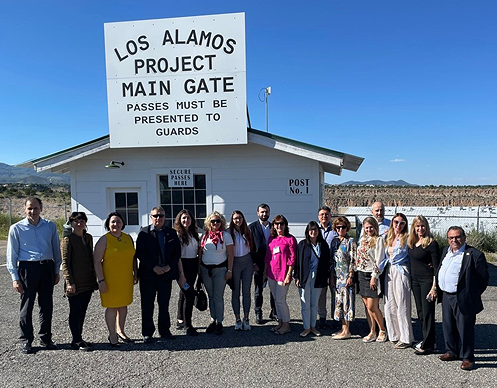
Participants at the Los Alamos Main Gate
The group also toured LANL and SNL affiliated science museums, including the Bradbury National Museum of Nuclear Science, the National Museum of Nuclear Science and History, as well as the Los Alamos History Museum.
One participant expressed, “It was a big honor to be invited to the place where the nuclear era started. I was flattered by the lab’s interest in our comments since it also gave them the understanding of the regional context. The visit enhanced our understanding of some technical aspects, especially in terms of the use of special radiation measuring equipment.”
Another participant concurred that, “Visits to LANL and SNL offered exceptional opportunities for first-hand experiences both in terms of seeing the actual locations, as well as regarding in person meetings with the leadership and seasoned experts. I was particularly interested in the discussion regarding strategic communications and the technical capabilities that can be developed in connection to combating disinformation and achieving societal resilience.”
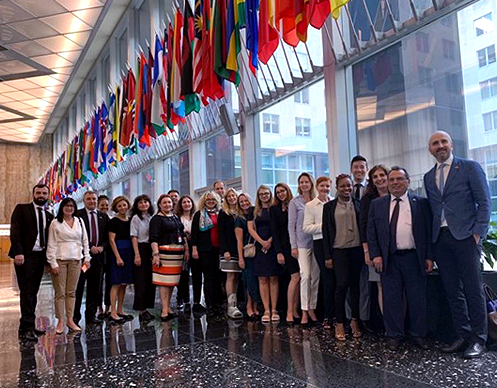
Participants at the Department of State
Washington DC
The second part of the US-Black Sea Nonproliferation Professionals Exchange US Module took place September 10-14, 2022, in Washington DC. The first day in DC participants visited the US Department of State. Briefings and discussions were hosted by the Bureau of International Security and Nonproliferation (ISN), with experts joining from the Office of Policy Coordination (host), Export Control and Related Border Security Program (EXBS), Office of Cooperative Threat Reduction (CTR), and the Office of Biological Policy.
The group was welcomed by Ann Ganzer, Principal Deputy Assistant Secretary of States International Security and Nonproliferation Bureau.
Other topics presented by experts from the above-mentioned offices included:
- Programmatic Efforts in Countering Russian Malign Influence
- “FIRST” Program – Building Capacity for SMR Deployments under the Highest Safety, Security, and Nonproliferation Standards
- “FIRST” Programming through Science and Technology Centre Ukraine (STCU)
- How 1540 Supports Preventative Defense Measures and Related Assistance
- Russian Malign Activities Related to the Biological Weapons Convention
Participants also enjoyed guest speaker Thomas Countryman, the US Representative for 2022 Nonproliferation Treaty (NPT) Main Committee on Nonproliferation, and former ISN Assistant Secretary.
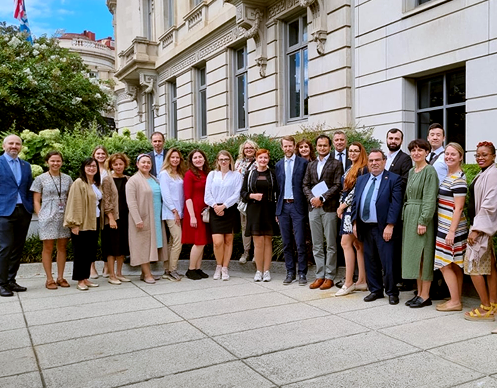
Participants at the Carnegie Endowment for International Peace
Day two in Washington DC offered participants the opportunity to meet and network with several experts from prominent think tanks and research institutions, including the Stimson Center, the Carnegie Endowment for International Peace, and the Nuclear Threat Initiative (NTI). The day concluded with briefings from the US Department of Energy, the National Nuclear Security Administration, and the Office of Radiological Security.
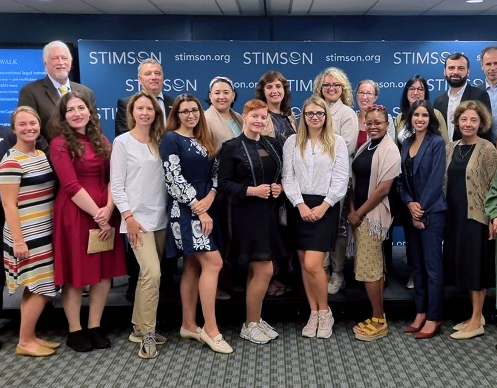
Participants and the Stimson Center
On the final day of the program, participants met with DC-based CNS experts, including Dave Schmerler, Chen Kane, and Nomsa Ndongwe who covered the following topics:
- Open-Source Research and Satellite Imagery
- Joint Comprehensive Plan of Action (JCPOA)
- New Challenges to the Rules-Based International Order and International Organizations in 2022
The official program agenda concluded with a group discussion. Participants contributed thoughts and feedback on the program of the US Module and the status of the US-Black Sea Nonproliferation Professionals Exchange program in general. Several action items for the group’s next steps were identified, including publishing collective research projects, creating a database of regional experts, formalizing the exchange program, and turning it into a community of experts recognized both regionally and internationally.
The US Module ended with a tour of the US Capitol and observation of a US Senate hearing.
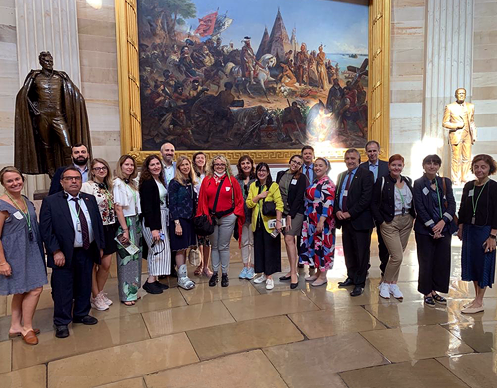
Participants at the US Capitol
The US-Black Sea Nonproliferation Professionals Exchange Program has been recognized by US counterparts as an exceptional initiative geared towards mid-level experts that can serve as a model for organizing similar nonproliferation professional exchanges for experts in regions all around the world. This program became possible due to financial support provided by the Department of State’s Bureau of International Security and Nonproliferation. The program’s successful implementation would not be possible without support from ISN, and in particular, the strong commitment by Jennie Gromoll, Senior Advisor for Europe and Eurasia, ISN Bureau, US Department of State.
The US-Black Sea Nonproliferation Professionals Exchange will continue to foster ties between US and Black Sea technical and policy communities and provide future opportunities for networking and professional growth.
